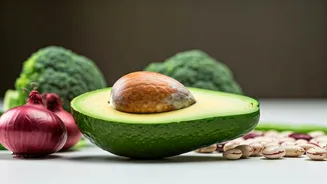Food Triggering Issues
The discussion revolves around everyday foods that can unexpectedly cause gas and bloating in individuals. A cardiologist from Russia has pointed out that while
these foods are often considered healthy, they can sometimes lead to digestive problems. This is particularly relevant for those with specific health conditions or sensitivities. The focus is on understanding which common foods are most likely to trigger these symptoms and how they interact with the digestive system. This introduction sets the stage for a deeper exploration of these foods and their effects, providing a foundation for the subsequent sections, each delving into specific food groups and their impact on bloating and gas production.
Common Culprits Explained
Several seemingly healthy foods are prone to causing gas and bloating. Bananas, though rich in nutrients, contain high levels of fructose and other sugars that can be hard to digest for some individuals, leading to gas. Spinach, often praised for its vitamins and minerals, also contains raffinose, a type of carbohydrate that's difficult for the body to break down effectively, which can cause bloating. Additionally, foods like beans, broccoli, cabbage, and onions, while highly nutritious, have compounds that produce gas during digestion. Understanding these factors helps one identify and manage potential triggers. The article further clarifies that individual sensitivities vary, and what causes bloating in one person may not affect another. Thus, identifying specific trigger foods is a personalized journey.
Who's at Risk?
The article suggests that certain groups of people are especially susceptible to the gas-producing effects of these foods. Individuals with existing digestive issues, such as irritable bowel syndrome (IBS) or lactose intolerance, are more likely to experience bloating and gas when consuming these foods. The cardiologist likely mentions that people with weakened digestive systems or those with specific food sensitivities should be extra cautious. The article aims to inform individuals about their particular vulnerabilities and make them aware of the potential effects of seemingly healthy foods. This segment underscores the importance of mindful eating and personalized dietary adjustments.
Practical Advice
To reduce gas and bloating, the article might provide helpful dietary strategies. One suggestion is to consume foods in moderation and combine them with other ingredients that aid digestion. Another tip could be to eat slowly and chew food thoroughly, which helps the body break down food more effectively. Furthermore, the article might propose techniques like keeping a food diary to pinpoint specific triggers. It is important to explore the potential benefits of cooking methods like steaming or boiling, which can alter food composition to reduce gas-producing elements. The article aims to offer clear, actionable advice to help people manage their diet and minimize discomfort.




















